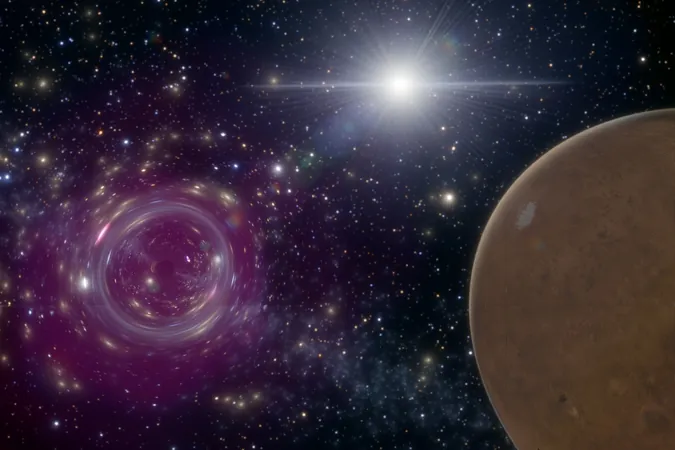
Could a Hidden Cosmic Wobble from Mars Reveal the Secrets of Dark Matter?
2024-09-17
Author: Rajesh
Introduction
In a groundbreaking new study, physicists from MIT are stirring up excitement with the tantalizing possibility that a wobble in Mars’ orbit could signal the presence of elusive dark matter, potentially composed of microscopic primordial black holes. This bold theory, which first emerged in the 1970s, suggests that these mysterious gravitational entities could zip through our solar system at least once every decade, exerting enough influence to be detected by today’s advanced technology.
Significance of Accurate Measurements
Study author David Kaiser, a professor of physics at MIT, emphasizes the significance of utilizing our precise understanding of celestial distances. "Scientists know the distance between Earth and Mars to an accuracy of about 10 centimeters," he states. "If we see a wobble, it would provide compelling evidence to investigate further the notion that dark matter comprises black holes formed in the very early universe, right after the Big Bang, and that they have been traversing the cosmos for approximately 14 billion years."
Detection of Wobble
The revelation, published in *Physical Review D*, indicates that if a primordial black hole were to pass near Mars, it could instigate a tiny but detectable wobble in the planet's orbit—an effect that could shift Mars’ position by around a meter within a few years. This detection could boost advocacy for the primordial black hole theory, which posits that these entities were birthed from dense pockets of gas in the infant universe, rather than arising from the collapse of massive stars like typical black holes.
Dark Matter Mystery
Interestingly, less than 20% of all matter in the universe is visible. The remaining 80% is shrouded in mystery as dark matter. Normally undetectable across the electromagnetic spectrum, dark matter is believed to exert a gravitational influence potent enough to affect stellar movements. Various ground-based detectors have attempted to uncover dark matter's secrets, mainly focusing on exotic particles, but results have been disappointingly scarce.
Humorous Hypothetical
The new study’s exciting premise materialized when researchers posed a seemingly absurd question: what might happen if a primordial black hole passed through a human body? Initial humorous calculations showed that if such a black hole flew near a person, they could be displaced significantly—although the odds of this happening are astronomically low.
Simulation Results
Using simulations of the solar system that accounted for gravitational interactions among planets and moons, the team simulated primordial black hole trajectories. They discovered that if a black hole were to pass within a few hundred million miles of Mars, its gravitational effects would manifest as a detectable wobble in Mars' orbit.
Next Steps in Research
As researchers work to distinguish this wobble from potential influences of ordinary asteroids, the implications are becoming incredibly exciting. "We need to clarify typical background data from regular space rocks compared to the unique paths of primordial black holes," Kaiser remarked.
Conclusion
This study may open a new frontier in the ongoing quest to uncover the true nature of dark matter. As astronomers continue to monitor Mars and refine their simulations, scientists worldwide are watching closely, hopeful that the next cosmic "close encounter" could yield answers to one of the universe's biggest mysteries. Could we finally be on the verge of confirming primordial black holes as a significant contributor to dark matter? Only time and technological advancements will tell! Stay tuned!



 Brasil (PT)
Brasil (PT)
 Canada (EN)
Canada (EN)
 Chile (ES)
Chile (ES)
 Česko (CS)
Česko (CS)
 대한민국 (KO)
대한민국 (KO)
 España (ES)
España (ES)
 France (FR)
France (FR)
 Hong Kong (EN)
Hong Kong (EN)
 Italia (IT)
Italia (IT)
 日本 (JA)
日本 (JA)
 Magyarország (HU)
Magyarország (HU)
 Norge (NO)
Norge (NO)
 Polska (PL)
Polska (PL)
 Schweiz (DE)
Schweiz (DE)
 Singapore (EN)
Singapore (EN)
 Sverige (SV)
Sverige (SV)
 Suomi (FI)
Suomi (FI)
 Türkiye (TR)
Türkiye (TR)
 الإمارات العربية المتحدة (AR)
الإمارات العربية المتحدة (AR)